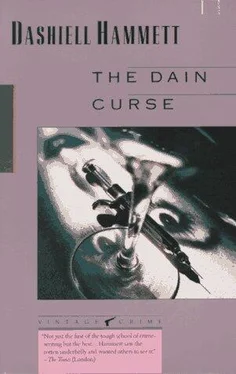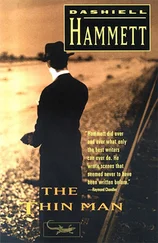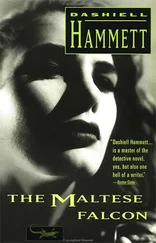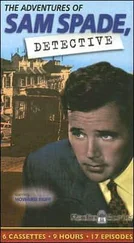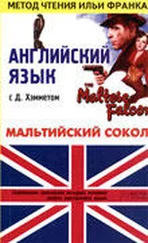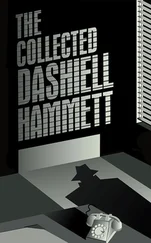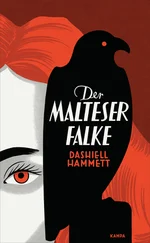"You killed him," I said to her. "He was going away. He wrote this statement, shouldering your crimes. You killed Ruppert down in the kitchen. That's what the girl was talking about. Your husband's letter sounded enough like a suicide letter to pass for one, you thought; so you murdered him-murdered him because you thought his confession and death would hush up the whole business, keep us from poking into it any further."
Her face didn't tell me anything. It was distorted, but in a way that might have meant almost anything. I filled my lungs and went on, not exactly bellowing, but getting plenty of noise out:
"There are half a dozen lies in your husband's statement-half a dozen that I can peg now. He didn't send for you and his daughter. You traced him here. Mrs. Begg said he was the most surprised man she had ever seen when you arrived from New York. He didn't give Upton the diamonds. His account of why he gave them to Upton and of what he intended doing afterwards is ridiculous: it's simply the best story he could think of on short notice to cover you up. Leggett would have given him money or he would have given him nothing: he wouldn't have been foolish enough to give him somebody else's diamonds and have all this stink raised.
"Upton traced you here and he came to you with his demand-not to your husband. You had hired Upton to find Leggett; you were the one he knew; he and Ruppert had traced Leggett for you, not only to Mexico City, but all the way here. They'd have squeezed you before this if they hadn't been sent to Sing Sing for another trick. When they got out, Upton came here and made his play. You framed the burglary; you gave Upton the diamonds; and you didn't tell your husband anything about it. Your husband thought the burglary was on the level. Otherwise, would he-a man with his record-have risked reporting it to the police?
"Why didn't you tell him about Upton? Didn't you want him to know that you had had him traced step by step from Devil's Island to San Francisco? Why? His southern record was a good additional hold on him, if you needed one? You didn't want him to know you knew about Labaud and Howart and Edge?"
I didn't give her a chance to answer any of these questions, but sailed ahead, turning my voice loose:
"Maybe Ruppert, following Upton here, got in touch with you, and you had him kill Upton, a job he was willing to do on his own hook. Probably, because he did kill him and he did come to you afterwards, and you thought it necessary to put the knife into him down in the kitchen. You didn't know the girl, hiding in the pantry, saw you; but you did know that you were getting out of your depth. You knew that your chances of getting away with Ruppert's murder were slim. Your house was too much in the spotlight. So you played your only out. You went to your husband with the whole story-or as much of it as could be arranged to persuade him-and got him to shoulder it for you. And then you handed him this— here at the table.
"He shielded you. He had always shielded you. You," I thundered, my voice in fine form by now, "killed your sister Lily, his first wife, and let him take the fall for you. You went to London with him after that. Would you have gone with your sister's murderer if you had been innocent? You had him traced here, and you came here after him, and you married him. You were the one who decided he had married the wrong sister, and you killed her."
"She did! She did!" cried Gabrielle Leggett, trying to get up from the chair in which Collinson was holding her. "She-"
Mrs. Leggett drew herself up straight, and smiled, showing strong yellowish teeth set edge to edge. She took two steps toward the center of the room. One hand was on her hip, the other hanging loosely at her side. The housewife-Fitzstephan's serene sane soul-was suddenly gone. This was a blonde woman whose body was rounded, not with the plumpness of contented, well-cared-for early middle age, but with the cushioned, soft-sheathed muscles of the hunting cats, whether in jungle or alley.
I picked up the pistol from the table and put it in my pocket.
"You wish to know who killed my sister?" Mrs. Leggett asked softly, speaking to me, her teeth clicking together between words, her mouth smiling, her eyes burning. "She, the dope fiend, Gabrielle-she killed her mother. She is the one he shielded."
The girl cried out something unintelligible.
"Nonsense," I said. "She was a baby."
"Oh, but it is not nonsense," the woman said. "She was nearly five, a child of five playing with a pistol that she had taken from a drawer while her mother slept. The pistol went off and Lily died. An accident, of course, but Maurice was too sensitive a soul to bear the thought of her growing up knowing that she had killed her mother. Besides, it was likely that Maurice would have been convicted in any event. It was known that he and I were intimate, that he wanted his freedom from Lily; and he was at the door of Lily's bedroom when the shot was fired. But that was a slight matter to him: his one desire was to save the child from memory of what she had done, so her life might not be blackened by the knowledge that she had, however accidentally, killed her mother."
What made this especially nasty was the niceness with which the woman smiled as she talked, and the care-almost fastidious-with which she selected her words, mouthing them daintily. She went on:
"Gabrielle was always, even before she became addicted to drugs, a child of, one might say, limited mentality; and so, by the time the London police had found us, we had succeeded in quite emptying her mind of the last trace of memory, that is, of this particular memory. This is, I assure you, the entire truth. She killed her mother; and her father, to use your expression, took the fall for her."
"Fairly plausible," I conceded, "but it doesn't hang together right. There's a chance that you made Leggett believe that, but I doubt it. I think you're trying to hurt your step-daughter because she's told us of seeing you knife Ruppert downstairs."
She pulled her lips back from her teeth and took a quick step toward me, her eyes wide and white-ringed; then she checked herself, laughed sharply, and the glare went from her eyes-or maybe went back through them, to smolder behind them. She put her hands on her hips and smiled playfully, airily, at me and spoke playfully to me, while mad hatred glowed behind eyes, smile, and voice.
"Am I? Then I must tell you this, which I should not tell you unless it was true. I taught her to kill her mother. Do you understand? I taught her, trained her, drilled her, rehearsed her. Do you understand that? Lily and I were true sisters, inseparable, hating one another poisonously. Maurice, he wished to marry neither of us-why should he?-though he was intimate enough with both. You are to try to understand that literally. But we were poverty-ridden and he was not, and, because we were and he wasn't, Lily wished to marry him. And I, I wished to marry him because she did. We were true sisters, like that in all things. But Lily got him, first-trapped him-that is crude but exact-into matrimony.
"Gabrielle was born six or seven months later. What a happy little family we were. I lived with them-weren't Lily and I inseparable?-and from the first Gabrielle had more love for me than for her mother. I saw to that: there was nothing her Aunt Alice wouldn't do for her dear niece; because her preferring me infuriated Lily, not that Lily herself loved the child so much, but that we were sisters; and whatever one wanted the other wanted, not to share, but exclusively.
"Gabrielle had hardly been born before I began planning what I should some day do; and when she was nearly five I did it. Maurice's pistol, a small one, was kept in a locked drawer high in a chiffonier. I unlocked the drawer, unloaded the pistol, and taught Gabrielle an amusing little game. I would lie on Lily's bed, pretending to sleep. The child would push a chair to the chiffonier, climb up on it, take the pistol from the drawer, creep over to the bed, put the muzzle of the pistol to my head, and press the trigger. When she did it well, making little or no noise, holding the pistol correctly in her tiny hands, I would reward her with candy, cautioning her against saying anything about the game to her mother or to anyone else, as we were going to surprise her mother with it.
Читать дальше
